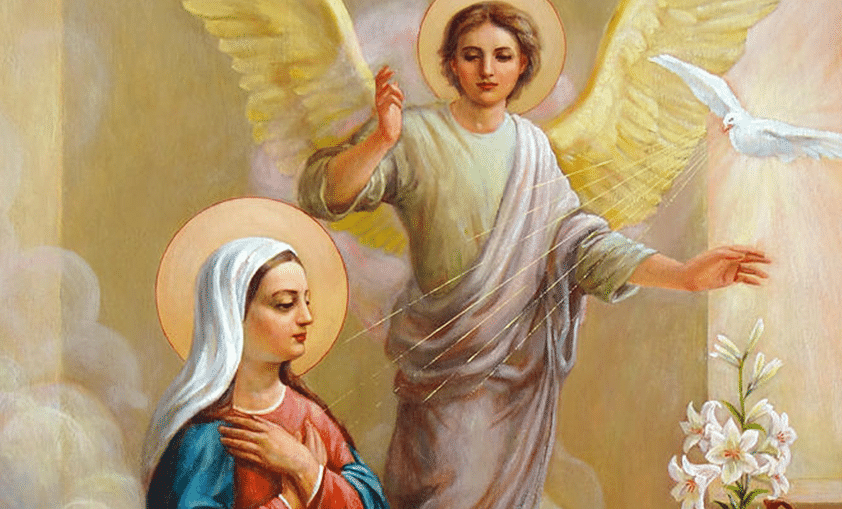Every year the Catholic Church celebrates the feast of the Annunciation, when the Angel Gabriel appeared to Mary and Mary gave an unreserved “yes” to the mission of conceiving and bearing Christ.
This is an important feast day for us as Catholics for a lot of reasons—though I admit that one of the reasons I often think of it fondly is that it’s one of two special days in the liturgical year where we genuflect during the Creed!
But the fantastic celebratory nature of this feast goes much deeper than that. In fact, it can hold particular resonance for us during our single years.
Here are three reasons that the feast of the Annunciation is relevant for Catholic singles.
1. Mary is an example of deep humility

When my husband and I began praying the rosary together on a regular basis during our dating relationship, he introduced me to the fruits of the Rosary’s mysteries.
My husband had actually memorized not only all twenty of the mysteries of the Rosary, but also the various fruits that the Church suggests we pray for in honor of each mystery (as if he were trying for extra credit or something!).
When it comes to the first Joyful Mystery, the Annunciation, this fruit is humility.
Now on the surface, Mary’s humility here isn’t necessarily that obvious. But if we consider what she was saying yes to, and how she was saying yes, her humility becomes pretty clear.
She was saying an unreserved yes to a lifetime of suffering. She didn’t bargain with God, suggest an easier route, or complain that her path would be too difficult. Instead, she humbly submitted herself to God’s plan, knowing that he knew better than her.
And she even called herself the handmaid of the Lord. A handmaid was a female servant. By calling herself the Lord’s handmaid, she was submitting herself, entirely and in all humility, to God.
It’s easy for us to balk at our sufferings and even to question God’s plans for us, especially during years of singleness that can feel endless at times.
But Mary’s example of humility can help remind us of the way we should submit ourselves humbly to God’s plan for us.
2. Mary trusted God, even when things didn’t make sense

Mary’s trust in God goes hand-in-hand with her humility. She understood, in her humility, that her knowledge was limited and God’s was infinite. So she trusted that his plan was better than what she could understand.
But she didn’t shy away from the fact that this was a confusing situation for her. Without doubting, she nonetheless asked for clarification, so she could understand better just how this would work: “How can this be, since I have no relations with a man?”
I’ve always thought this was one of the most beautiful illustrations of how we are to trust, but are still to use our God-given intellects.
Sometimes people use the phrase “blind trust” to describe how we are to trust God. But I don’t think that’s a very accurate term. He did give us intelligence, and he wants us to try to understand what we can with it.
So as we struggle through confusing moments and circumstance in our lives, we do need to trust in God’s loving providence for us. But we should also strive, like Mary, to understand as much as we can.
What does this look like concretely for Catholic singles?
This might mean seeking out advice from a priest when we don’t know what God is calling us to do. It might mean some deep soul-searching when we can’t figure out why past relationships have ended badly. It probably means for all of us to directly ask God in prayer for enlightenment when things are confusing.
3. Mary’s yes helped bring about our much needed salvation

Mary’s yes is really the reason that this feast means so much for every single person ever born, and it’s the most important aspect at the heart of the Annunciation.
We get to genuflect during the Creed every year on the feast of the Annunciation (and on Christmas!) because “by the Holy Spirit [He] was incarnate of the Virgin Mary and became man.”
This feast is to commemorate and celebrate the fact that, at the words of assent from Mary, Christ was conceived in her womb and entered the world to save us all.
No matter what we might be struggling with in our lives, no matter how we might have failed in the past or might fall into old sins again in the future, Christ came to earth to save us.
So if things feel bleak, dark, or confusing, if the spiritual desert of Lent is getting to us about now, we can bring our focus back to the happy fact that Mary worked with God to bring salvation to all of us and to make it possible for us to spend eternity in Heaven.



